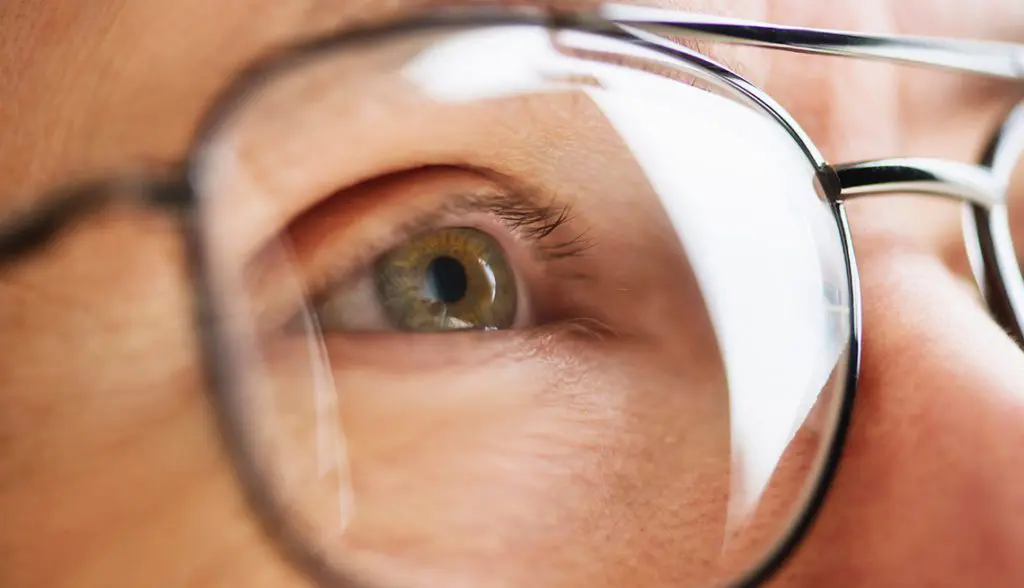Contents
What Are Drusen?
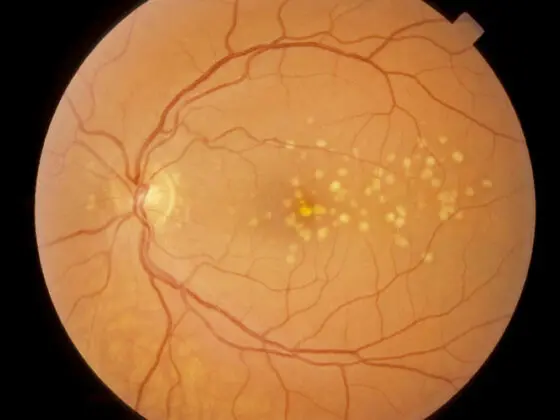
The yellow deposits under the retina are referred to as Drusen. They are made from lipids and proteins whose deposits get increased with age. The yellow deposits cause the color of the eye yellow. “Age-related macular degeneration” is not likely to be caused by the same. Although, the danger of being affected by age-related macular degeneration is increased if an individual has Drusen.
Drusen are like tiny pebbles of debris that get accumulated over time. There are two different types of drusen: soft and hard.
- “soft” drusen are large and cluster closer together
- “hard” drusen are smaller and relatively far from each other
These can be of various kinds. Large Drusen may cause vision problems later in life while a small Drusen may not cause vision problems for a long time.
Large Drusen can also increase the risk of age-related macular degeneration, which can later result in vision loss.
Optic Disc Drusen
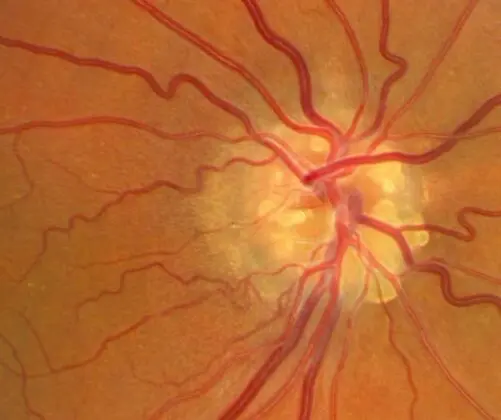
This yellow deposit can also occur in the optic nerve of the eye. The ones which occur in the optic nerve are made up of calcium salts and proteins and can appear in both eyes. The ones which develop in the optic nerve are also known as “Optic disc Drusen.” They often appear in children than in adults, as this condition is not related to aging. These kinds of Drusen are also not associated with age-related macular degeneration. Optic disc Drusen are not responsible for any effect on vision. But it may happen that some patients with optic disc Drusen may suffer from loss of peripheral vision.
Causes Of Drusen
It naturally occurs with age, but some people confuse it with age-related macular degeneration. There has never been any clear difference between Drusen and age-related macular degeneration. Although, if an individual has been affected by this problem for an extended time then, this might be a symptom of age-related macular degeneration.
Symptoms Of Drusen
There are not any symptoms when people suffer from this eye problem. Only a routine eye exam can reveal the presence of this condition within the eye. If a person suffers from small Drusen, then it is not a symptom of any eye disease. Nevertheless, the presence of an outsized number of Drusen can be an early symptom of dry age-related macular degeneration. Some of the symptoms of age-related macular degeneration include “hazy vision, difficulty in seeing from bright light to low light, and a blank or a blurry spot in the central vision, yellow eye”
There are often no signs of optic nerve Drusen. But, it can happen that some patients suffering from it, same may experience vision-related problems such as “loss of peripheral eye vision and temporary graying or flickering of vision.”
Who Is At Risk of Developing Yellow Eye?
They are caused mostly to the people of age sixty or older. Normally, being affected by this eye problem could be a sign of aging. Some of the risk factors associated with age-related macular degeneration include “family history of eye diseases, smoking, and high cholesterol level.”
The risk of getting optic nerve Drusen increases in people that are descendants of Caucasians or have had a family history with major health problems.
Yellow Eye Prevention
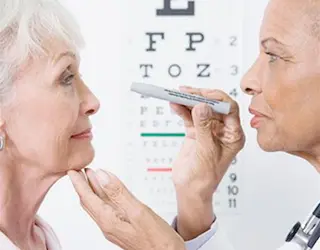
A routine eye exam or an early diagnosis based on the symptoms can help the ophthalmologist to find if the patient has developed age-related macular degeneration or not. A person with small Drusen doesn’t have the risk of developing the condition of age-related macular degeneration.
In case of major detection of symptoms, it is necessary to prevent the patient from developing age-related macular degeneration. Early treatment can help to slow down the progression of disease and vision loss.
Having an annual eye exam, even if you do not have any symptoms, is very important. There is no appropriate treatment available for this eye problem and sometimes this condition can disappear on its own. In case, they are detected in an eye exam, the ophthalmologist would have a regular eye monitoring of the patient’s eyes.
In case someone is diagnosed with Drusen, correct treatment at an early stage can help in slowing down the progression.
Drusen Diagnosis
Only during a dilated eye exam, detection of this problem can take place. In a dilated eye exam, the ophthalmologist dilates the patient’s pupil with the help of dilating eye drops and then examines the patient’s eye with an ophthalmoscope.
An ophthalmoscope allows the doctor to see the retina and other areas at the back of the eye. A dilated eye exam will allow the ophthalmologist to ensure if the patient has been affected by the problem or not.
In case the ophthalmologist finds this eye problem, then they examine the patient with the use of an Amsler grid. They use an Amsler grid to see for macular degeneration symptoms. The symptoms include “dark and blurry vision, wavy vision in the dark, and black spots which decreases the eye vision.”
In case the ophthalmologist thinks that the person might be suffering from optic nerve Drusen, an additional eye exam is conducted.
Drusen/Yellow Eye Treatment
Small Drusen usually do not requires treatment. In an eye routine check-up, your ophthalmologist may find some minor signs and symptoms of the disease. Then he/she would perform another eye exam to ensure that it doesn’t develop into large Drusen.
As large Drusen is a sign of age-related macular degeneration, the ophthalmologist would perform the appropriate AMD treatment for the patient. Some people think that the elimination of Drusen can lead to an improvement in age-related macular degeneration. But this is false, as trying to remove these will not be effective in improving your age-related macular degeneration.
In case someone suffers from optic nerve Drusen, they should have regular eye monitoring. There is no effective treatment for optic nerve Drusen. In rare cases, where a person might develop “Choroidal neovascular membranes”, then treatment may be appropriate.
Can Drusen Cause Blindness?
Although it does not cause total blindness, it can result in central vision loss. Central vision is the vision that allows people to focus on details while keeping a straight head.
All those who suffer from large Drusen are at a high risk of losing central vision as compared to those people who have small Drusen. The reason behind this is because, the presence of large Drusen that develops under the macula (which is the small area in the center of the retina), increases the risk of age-related macular degeneration.
Age-related macular degeneration is a type of progressive disease, which means that it gets worse over time. Age-related macular degeneration is linked with problems like retinal damage and central vision loss. Although it does not cause complete blindness it can lead to major eye problems related to vision discrepancy.
There are no vision problems caused by small Drusen. Still, suffering from it, for a longer period can cause large Drusen.
As mentioned before, the optic nerve Drusen can be the cause of peripheral vision loss which with time can lead to central vision loss too. Sometimes the vision loss caused by the former eye problem is so minimal that the person suffering from it may not even realize it.
Optic Nerve Drusen Vs. Papilledema
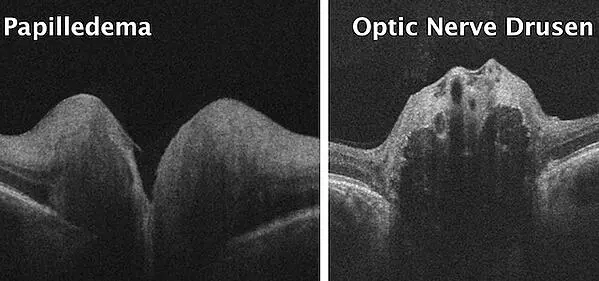
The margins of the optic nerve can sometimes be blurred because of the optic nerve drusen. This condition can be similar to another eye problem known as papilledema.
The swelling of the optic nerve causes papilledema. This eye problem can be caused due to the high pressure in the brain. Many times papilledema can be a sign of fundamental conditions such as “meningitis, or a brain injury.” This problem can get serious if not corrected with appropriate treatment.
During an eye exam, both optic nerve drusen and papilledema can appear the same, though they are so different from each other. To know what the person is actually suffering from, an ophthalmologist performs an ocular ultrasound along with a few other exams before conducting any final diagnosis.
The best way to treat your eyes is to visit your eye care professional and get your eyes checked regularly. He will be able to assess the best method of treatment for your eye ailment.
Visit our website Eyemantra. To book an appointment call at +91-9711115191. Or mail us at [email protected]. Our other services include Retina Surgery, Specs Removal, Cataract Surgery, and many more.

